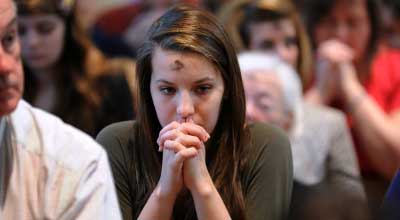Half of Non-Churchgoers Don’t Believe They Have Purpose
A recent LifeWay Research study found that Americans with even a slight curiosity about an ultimate purpose to life are more likely to participate in worship services, while half of those who never attend church never wonder about life’s ultimate purpose.
Approximately 75 percent of the 2,000 adults surveyed nationally indicate that they either agree or strongly agree with the statement, “There is an ultimate purpose and plan for every person’s life.” However, 50 percent of respondents who never attend worship services disagree with the statement.
“This contrast has significant implications for churches,” said Scott McConnell, director of LifeWay Research. “It is no wonder that many of the unchurched are unengaged in church activity when they don’t believe an exclusive purpose exists for their own lives – in other words, why go to church to learn about God’s plan if you don’t think there is one.”
The study examined three other aspects of meaning and purpose. More than two-thirds of Americans agree (strongly or somewhat) that the pursuit of meaning or purpose is a priority, but only half wonder about it each month. Seventy-eight percent agree “It is important that I pursue a higher purpose and meaning for my life” while 67 percent agree “A major priority in my life is finding my deeper purpose.”
When asked, “How often do you wonder: ‘How can I find more meaning and purpose in my life?'” 51 percent of Americans indicated at least monthly, including 18 percent who wonder about it daily. Thirteen percent wonder about finding more meaning and purpose yearly and 28 percent never think about it.
The study asked two questions about how often people think of specific aspects of the afterlife, the first being, “How often do you wonder: ‘If I were to die today, do I know for sure that I would go to heaven?'” Thirty-one percent of Americans wonder about this at least monthly, including 8 percent wondering about it daily. Eleven percent think yearly about personally going to heaven and 46 percent never think about it.
Comparatively, a 2006 study done by the North American Mission Board’s Center for Missional Research showed a similar number of Americans (44 percent) never wondered whether they would go to heaven when they die, but significantly more (20 percent) wondered daily about the question. The earlier study found significantly more Americans (32 percent) wondered daily about how they could find more meaning in their lives but a similar number (27 percent) never wondered about the search for more meaning.
The new study also asked respondents for their level of agreement with the statement, “I think often about what I must do to experience peace in the afterlife,” with 42 percent agreeing (20 percent strongly) and 50 percent disagreeing (30 percent strongly). Those who never attend religious services are the most likely to strongly disagree (63 percent).
Reacting to the statement, “There is an ultimate purpose and plan for every person’s life,” 18-29 year-olds are the least likely to strongly agree (40 percent). This reflects attitudes expressed in other LifeWay Research studies that more closely examine this age demographic and its diverse views of spirituality. In his book, Lost and Found, LifeWay Research President Ed Stetzer found that 89 percent of unchurched young adults agreed when asked, “If someone wanted to tell me what she or he believed about Christianity, I would be willing to listen.”
In response to the question, “There is more to life than the physical world and society,” 88 percent agree, including 67 percent who strongly agree. The frequency of worship service attendance reveals large differences in the percent who “strongly agree:” Never attend 25 percent; Holiday attendance 49 percent; Rarely attend 66 percent; One to two times per month 74 percent; Weekly 83 percent; Multiple times per week 92 percent.
“The spirituality of Americans is clear,” McConnell said. “Even the slightest connection to church attendance corresponds to more consideration of possibilities beyond themselves, beyond physical and social realities. However where there is no worship attendance, spiritual realities are not something they think about often.”
For those who never attend church, the study revealed this group is least likely to pursue purpose and meaning in life or to think about the afterlife:
— 19 percent strongly disagree that there is more to life than the physical world and society;
— 33 percent strongly disagree that there is an ultimate purpose and plan for every person’s life;
— 63 percent strongly disagree that they think often about what I must do to experience peace in the afterlife;
— 50 percent never wonder how they can find more meaning and purpose in their life;
— 68 percent never wonder if they were to die today, do they know that they would go to heaven.
“It sounds like an obvious statement to say that those with no connection to attending religious service think less often about spiritual things,” McConnell said. “But the implication is significant for the church. Christians might assume that those who do not attend church are wondering about spiritual things, but many of them rarely do – and starting faith sharing conversations assuming people are wondering when that are not could be the wrong place to start.”
“Our previous research has shown that the unchurched are willing to discuss spiritual topics, so Christians should not shy away from sharing the purpose in life and salvation that Jesus Christ provides, but it helps us to know where they are to start that conversation,” McConnell concluded.














































